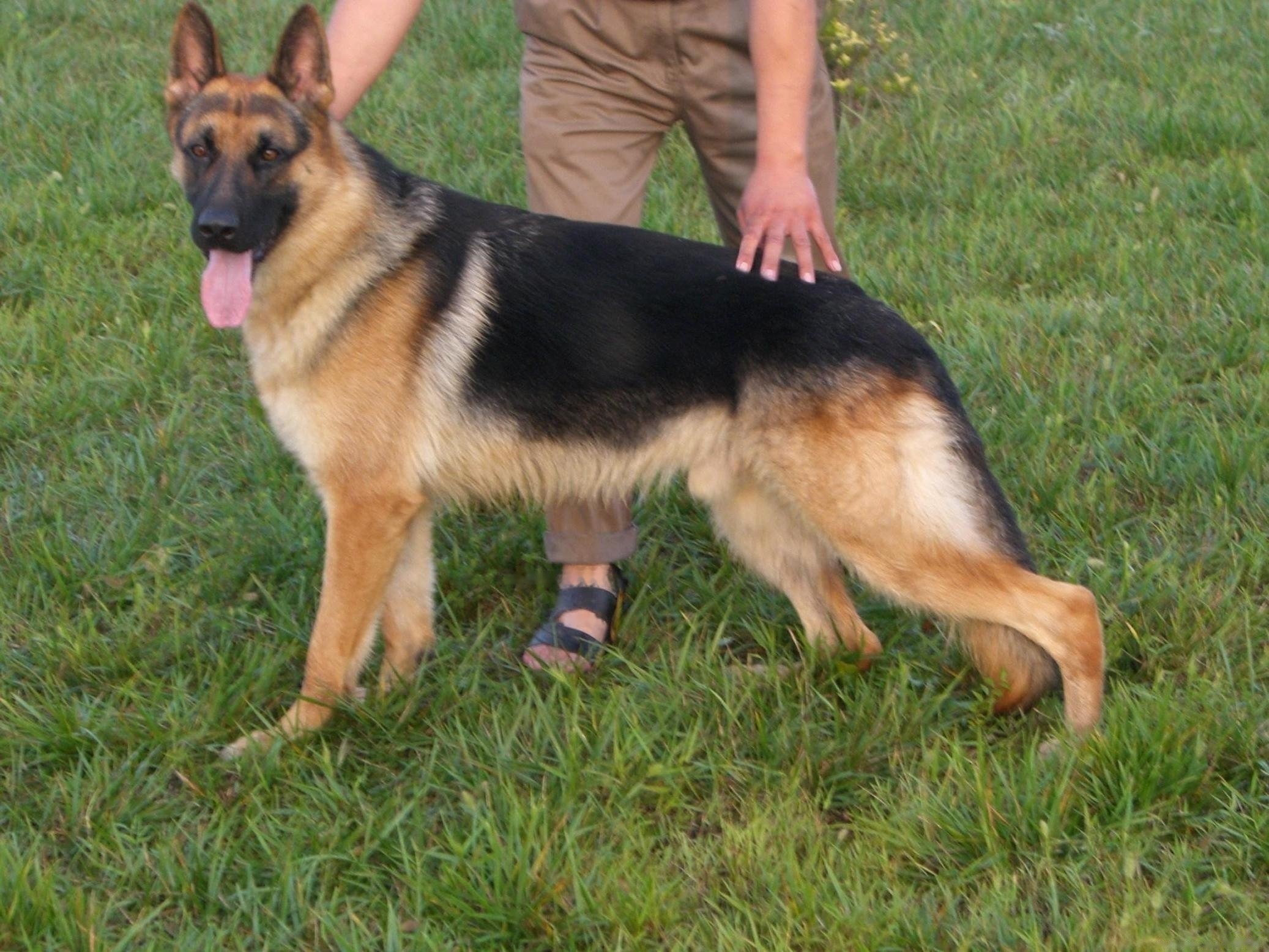Levels of Defense Training There are three levels of defense training, including defense first, second, and third.

Dogs undergoing Defensive Level 1 training must be at least 18 months old, GermanShepherd taking the Defensive Level 1 exam >The dog's personality (temperament) must be tested by professional referees first. The defense level 1 test mainly includes: walking on leash, walking without leash, sitting while walking, lying down while walking, sitting and waiting, and free running back. In these tests, whether on level ground or in an obstacle course, the dog must return immediately after being commanded, while in the marching search test, the dog must continue to walk on the prescribed route for at least 20 minutes.
To participate in the defense level 2 training, the dog must be at least 19 months old, must pass the defense level 1 test, and at the same time pass the password obedience and basic defense technology items required by the defense level 1 test again. The second-level test items are more difficult, more demanding and higher-level than the first-level defense, mainly in the dog's endurance, agility and flexibility, and control. An inclined wall spanning 6 feet has been added, and the dog must be able to search for at least 30 minutes along the designated route under the guidance of a stranger in the walking search test.
To participate in Defensive Level 3 training, dogs must be at least 20 months old and must qualify for Defensive 1 and 2. The defense level 3 exam is far more difficult than the first two levels. In the defense level 3 test, the dog must be off the leash. At the same time, the test of walking and running is added, especially in the walking search test, the dog must continue to walk along the prescribed route for more than 50 minutes under the guidance of a stranger. On the prescribed route, four turns should be set, three hidden objects must be placed, and the dog must find at least two.
What do the judges of the defense test look at for the dog's performance?
In all three levels, 100 points each for scouting, password obedience, and basic defense skills, totaling 100 points. 300 points. If a dog cannot reach 70 points in the two subjects of search by designated route and password obedience, and 80 points in the subject of basic defense skills, at the same time, if the dog fails the personality (temperament) test at the beginning or during the examination , then this dog will mean that the dog cannot pass the defense test and obtain the qualification of the defense level, and must be re-tested in the subsequent test, and the subjects passed this time must also be re-tested. In all tests, judges should focus on observing the test dog's desire to work, concentration and accuracy of work, and the dog should be happy throughout the test. A reminder to dog lovers here is that dogs that achieve higher grades and scores in competitions and exams tend to be dogs that perform naturally in exams with little or no evidence of heavy training. It is really interesting to understand this feeling carefully, and it is really interesting to grasp this proportion, and it really has a taste of Zen.
Do dogs like defensive training?
Any experienced dog trainer believes that the German Shepherd enjoys this kind of training very much. Because it is only during training that the dog owner will give full attention to the dog, and this is the greatest satisfaction for the dog. The most interesting of these is that training can make the dog's natural instincts educated, of course, these training should not make the dog feel repressed or forced. This is clearly stated in the North American training philosophy and rules. In fact, defense training often makes dogs feel very free and happy, and eager to perform and be recognized. A defense-trained dog can do anything for its owner as long as the owner gives a signal. Dogs can get pleasure from work, show good self-confidence, and are eager to perform well for their masters. The dog owner can also judge the working ability of the dog by the performance of the dog during training.
Defensive training is a must for companion dogs
For thousands of years, dogs have been regarded as the model in the animal kingdom for building relationships of mutual help and love. With a highly developed sense of hearing and smell, dogs can run at high speeds, capture prey, protect companions and alert the dog owner. Of course, people also provide selfless help to dogs, such as: protecting dogs from attacks by large carnivores; caring for wounded dogs; human hugs make dogs satisfied and so on.
Defensive training is the most prominent expression of a dog's ability to work, and a dog that has undergone defense training is often an ideal family companion who can be trusted and relied upon. A well-trained German Shepherd can fully accept all its living conditions, such as: heat, cold, noise, overcrowding, fright, etc., and the dog can show a fearless posture, absolutely not. There will be nervousness, anxiety, worry, combativeness, howling and other behaviors.
In short, defense training can give the dog owner many ways to control the German Shepherd, and also give the dog a lot of freedom, so that the dog owner and the dog can have more fun together. Through defense training, on the one hand, it brings joy to the dog, on the other hand, it also lets the dog know how to win the favor of the owner, and at the same time strengthens the close relationship between the dog owner and the dog.
![[Dog Training 5] The training method of pet dog dining etiquette](/static/img/12192/12192_1.jpg)




